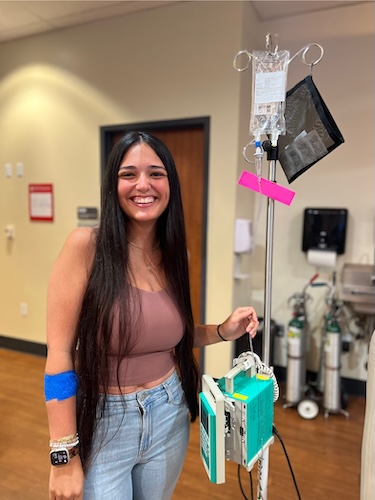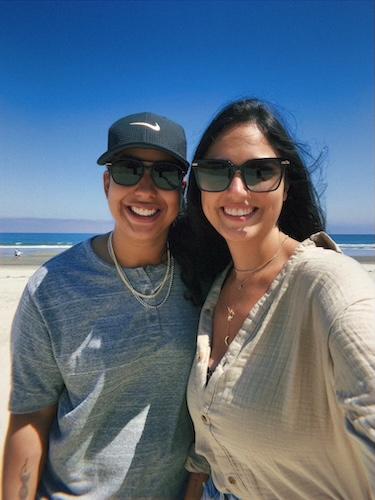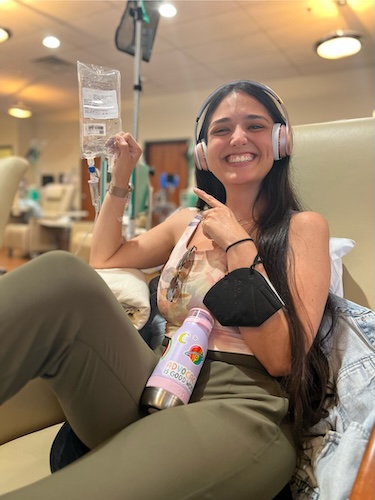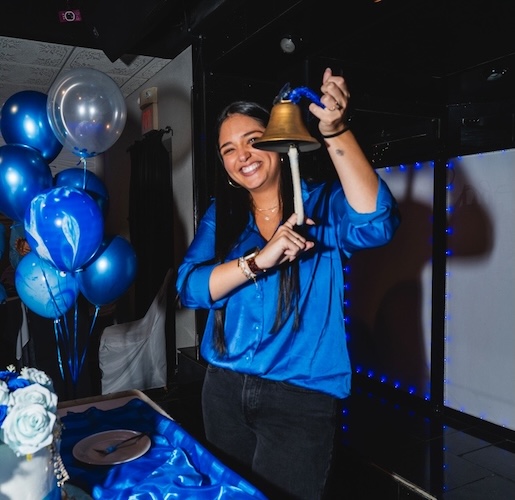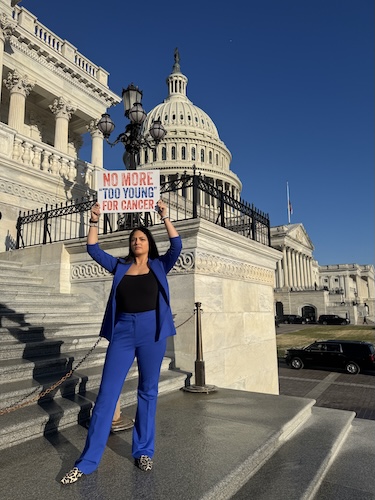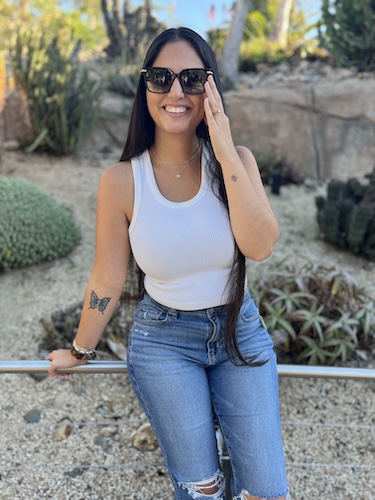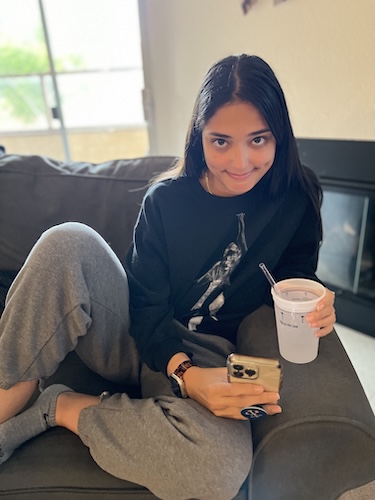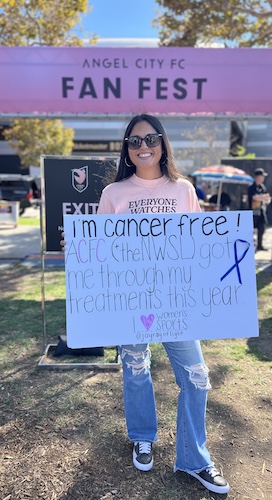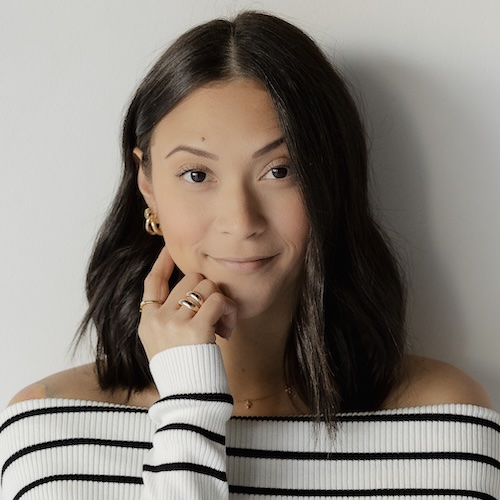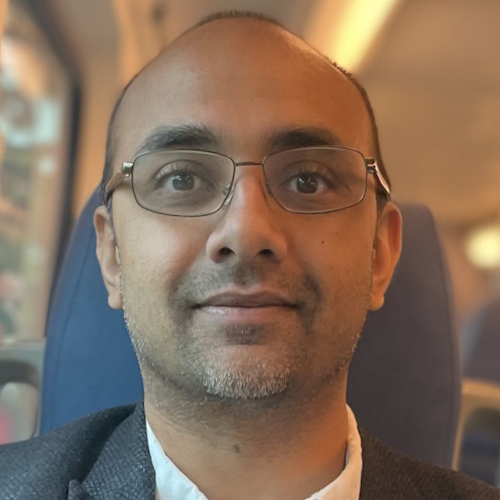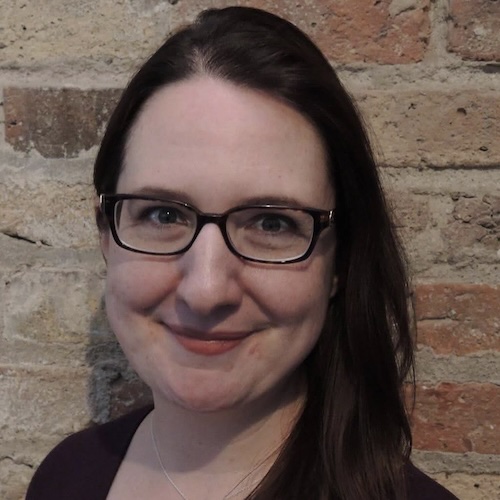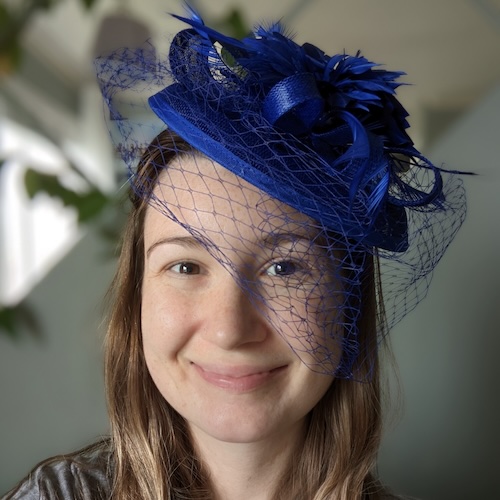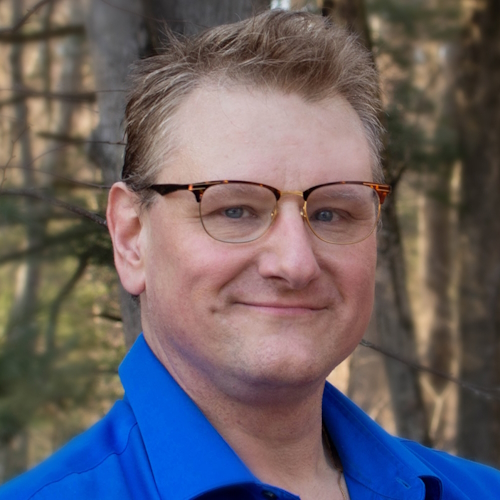Shattering Stereotypes: Jessica’s Stage 3 Rectal Cancer Experience at 29 Through Self-Advocacy
Jessica was devastated when she found out that she had stage 3 rectal cancer in 2024, when she was just 29. Her experience challenges perceptions of what cancer looks like and helps redefine survivorship on her own terms.
Interviewed by: Taylor Scheib
Edited by: Chris Sanchez
Jessica’s story began in 2023 when she noticed unusual symptoms, including bright red blood in her stool and persistent abdominal pain. Doctors attributed her symptoms to irritable bowel syndrome, but she felt deep down that something wasn’t right. Armed with the knowledge that she had Lynch syndrome and a strong sense of self-awareness, she pushed for and ultimately got a colonoscopy that revealed a six-centimeter mass in her rectum. Her determination to advocate for herself likely saved her life. (Editor’s Note: Lynch syndrome is the most commonly inherited cancer syndrome. It increases a person’s risk for colorectal cancer.)
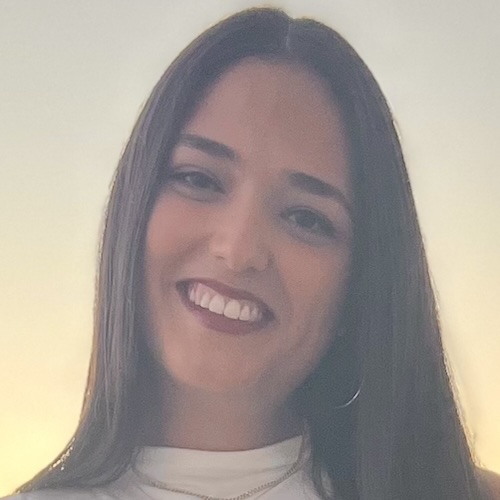
A striking aspect of Jessica’s experience with stage 3 rectal cancer is how she defies the typical “sick” stereotype far too often associated with cancer. She didn’t lose her hair, appear frail, or show any visible signs of illness. She credits immunotherapy, which she took through a clinical trial rather than traditional chemotherapy, for her well-being during treatment. Jessica’s body responded extraordinarily well to immunotherapy, with the mass disappearing entirely after just a few infusions. This alternative treatment not only preserved her physical health but also helped her maintain a sense of normalcy.
Jessica’s experience highlights the mental and emotional complexities of living with rectal cancer. From the anxiety of waiting for biopsy results to navigating survivorship, she learned for herself that the mental toll of cancer often outweighs the physical challenges. Her story emphasizes the importance of supportive relationships. She notes how her wife became a key part of her care team, and shares heartfelt moments when people in her life stepped up in meaningful and sometimes unexpected ways.
Survivorship isn’t a return to normal life for Jessica. It’s a brand-new chapter filled with intentional living. She now prioritizes experiences that bring her joy, like attending women’s soccer games and spending time in nature. Jessica’s philosophy is simple yet profound: live with purpose, advocate fiercely for your health, and cherish the connections that truly matter.
Watch Jessica’s video and scroll down to read her interview transcript. You’ll delve into her story:
- Cancer doesn’t always look like what we expect. See how her health and appearance defied stereotypes
- Self-advocacy can be life-saving. Jessica’s story shows how you should trust your intuition and speak up when something feels off
- Find out how immunotherapy can be a powerful alternative to chemotherapy
- Learn how mental health support is crucial during both active treatment and survivorship
- Jessica’s strong relationships with her wife, friends, and family prove that authentic connections grow stronger through vulnerability and support
- Name: Jessica A.
- Age at Diagnosis:
- 29
- Diagnosis:
- Rectal Cancer
- Staging:
- Stage 3
- Symptoms:
- Changes in bowel movements
- Blood in stool
- Abdominal pain
- Back pain
- Difficulty sitting comfortably
- Constipation
- Feeling of incomplete evacuation, as if some stool remained after bowel movements
- Mucus-like stool consistency
- Bloating
- Treatment:
- Immunotherapy through a clinical trial
This interview has been edited for clarity and length. This is not medical advice. Please consult with your healthcare provider to make informed treatment decisions.
The views and opinions expressed in this interview do not necessarily reflect those of The Patient Story.
- Hey, I'm Jessica
- I was diagnosed with Lynch syndrome
- When my first symptoms started
- Preparing for the colonoscopy
- The moment everything changed
- How I navigated how to tell people about my stage 3 rectal cancer diagnosis
- When I finally got the results back
- What my treatment plan looked like
- What my reaction was to being on a clinical trial
- What surveillance looks like for me
- How my partner and I have navigated this
- Cancer shifted my mindset
- What I want others to know
Hey, I’m Jessica
I’m currently 30 years old, living in San Diego with my wife.
I’m really big on women’s sports. Women’s soccer, women’s basketball. My wife and I, those are our hobbies. We got women’s soccer. Got me through cancer last year, watching the games every weekend after treatment.
I think cancer helped me to find those things that I like to do again and find a new appreciation for them. So, painting on the beach and writing poetry and all of those things.
I was diagnosed with Lynch syndrome
I was diagnosed with Lynch syndrome in February of 2023, and I didn’t know what that meant. I was getting mixed reactions from doctors about it. So I said, “I’m not paying attention to this right now.” Very typically millennial of me.
So my wife and I started talking about family planning, and when I went to my gynecologist, she went, “Okay, you have a history of cancer in your family. Let’s just do genetic testing. Get that out of the way.” My mom had breast cancer at 36. My father had prostate cancer really early. I have grandparents who had cancer. So, I went into it thinking I was going to come back with the BRCA gene. So I was like, breast cancer. My mom was 36. How else do you explain that? Then I have this paper come back, and it’s telling me I have Lynch syndrome, and this counselor is telling me, “Oh, just get a colonoscopy at 30,” and I thought, “I don’t even know what any of this means.” There was so little information about Lynch syndrome. There are multiple genetic mutations associated with Lynch syndrome. So it’s kind of like this umbrella of information. So, if it wasn’t for talking about family planning and my gynecologist, then I wouldn’t have known to do genetic testing.
I was getting all of these mixed reactions. I don’t feel any kind of stability, and so having the Lynch syndrome diagnosis earlier, before my symptoms had really started ramping up, I always tell people that the genetic testing is what saved my life, because I knew I needed to advocate for more. I knew that Lynch syndrome put me at a higher risk for colorectal cancer. Those were the things I did read out of all of the information I was given. So, it was like, if I didn’t know I had that, all right, well, the doctor doesn’t think it’s that, and I remember hanging up the call with my primary and saying out loud like, “Oh, she doesn’t think it’s cancer,” but that was already on my mind because I knew I had Lynch syndrome. So, it was one of those things that if I didn’t have it, I don’t know that I would have advocated for myself the way that I did.
When my first symptoms started
I’ve always had tummy problems, you know? That was the cute, trendy thing that everybody has. Certain things just bother my stomach, and then in the summer of 23, I realized that this is more than just that. I had changes in needing the bathroom, like going more often or feeling like I needed to go more often. I always had a trace of blood in my stool, but that summer, it was bright red. So everyone was like, “Oh, that’s hemorrhoids,” and I was like, “Okay.” And then it kept happening more consistently, and I realized that it couldn’t be a hemorrhoid all the time. That doesn’t make sense, but abdominal pain, all of your stereotypical colorectal cancer symptoms, were worrisome.
So I went to a primary doctor. She was like, “Oh, it sounds like IBS, but you can go to a gastro if you want.” I was like, well, I don’t want to live with it even if this is IBS, this is terrible. I don’t want this.”
So the gastro didn’t have anything open until November in person, so I waited until November, and then by the time I got to that appointment, I thought, “Something is really wrong.” I no longer cared what anyone was going to tell me. I went into that gastro appointment and she said, “Yeah, it does sound like IBS,” and I responded, “Okay, I have Lynch syndrome. I have blood in my stool all the time. I’m constipated, and I can’t go to the bathroom.” I listed everything out. And then I went, “I need a colonoscopy.
I have a family history of cancer. I’m not comfortable leaving here knowing that I feel this way and not checking anything.” She went, “Okay, I think I should be able to get you an early colonoscopy. I think insurance will approve it.” I went, “I don’t really care. I need to know. I will figure out the insurance part of it somehow.” But the guidelines for Lynch syndrome are to have your first colonoscopy at 30, and I was 29 at the time. “This needs to happen. I need answers.” I have medical anxiety, so I knew that about myself going into it.
At that point, I wasn’t even passing stool anymore. It was like a mucus-like consistency. Nothing was moving. I’m not getting an answer, but at the same time, it was like, “If I had gone earlier and my symptoms hadn’t been that bad, if she had told me it was IBS, would I have been at that point in November, where I was feeling that something was horribly wrong. I can’t even if it isn’t cancer, I can’t live like this. I can’t even go to the bathroom. I couldn’t even sit down at that point in November. Well, I was on a pillow all the time. I had lower back problems. There was something very wrong, and so I was able to say to myself at that point, “I can’t just walk out of here and be like, sure, it’s nothing,” because I know it’s not nothing.
Preparing for the colonoscopy
I went through the whole holiday season, and I don’t know. I guess I thought, “I’ll do it when I’m back.” But at the same time, things still were progressing, and it was like, I have all of these like experiences where I’m like, “Oh my gosh, this is getting worse.” It was still time for symptoms to keep evolving.
And so I think that was a really odd experience. Moreso because I had to do the prep. I think my mindset most of the time was like, “The only way out is through. I have to do this.” I drink the terrible stuff, and that was, I mean, my first ever colonoscopy, but I remember saying to myself when I was doing the prep, “I can’t be naive enough to think that this is nothing like I’ve lived in this body long enough. There’s no way that I can go into this thing.” I think it’s going to be fine, because I think in my head I knew, but it was one of those things. If I said it out loud, it made it real, you know? I just kind of kept that to myself, but kept saying to myself, “Don’t go into this,” blissfully ignorant of anything.
The moment everything changed
So I had the colonoscopy on a Friday.
I got dressed, and they were like, “Okay, you need to sit here and wait,” and I was like, “That’s weird.” But then again, I’ve never had a colonoscopy before; maybe that’s just how it goes. So, I was sitting there waiting, and the gastro came over to me and she bent down at my level on the chair, and I was like, “Oh, this isn’t good.” I looked at her, and she showed me these pictures, and I’m like, “Oh my God, what am I looking at? Those are my intestines.” She said, “So I found a mass. I’m 99% sure it’s cancer, but I’m going to send it in for pathology.”
In that moment, I realized, “Oh, self-advocacy works.” Because had I not pushed for this, I would be living with this mess. There was a six-centimeter mass in my rectum. And I went home with the imaging, and she was like, “You can’t do anything until Monday.”
It’s one of those things where it’s like they say the C word and then everything else is like, womp, womp, womp, you know? I don’t know if she said anything else to me after. I don’t know if she explained. I vaguely remember getting a surgeon’s business card, but it was really just kind of like, what’s next? Where do I go from here? And being on a Friday, it forced me to think about it over the weekend. I think for me it was: How do I move forward? You gave me this information. What’s next? I didn’t not permit myself to feel things, but it was like, in this moment, right now, I need to figure something out. I’m a fixer. That’s me. I’m a get-this-figured-out kind of person. So that was very much myself, and I think a lot of that.
How I navigated how to tell people about my stage 3 rectal cancer diagnosis
Then, after that, it was, “How do I tell people this? How do I tell my parents and my in-laws and my family, my friends?” You don’t just drop this into a text message.
Some people knew I was getting the colonoscopy. So these people were like, “How’d it go?” I think that’s really hard when you’re now somewhat responsible for letting down the people in your life. It’s not that you’re letting them down, not that you did anything personally, but you’re dropping this huge thing on them, and then you’re dealing with their reaction to it.
I think a key reminder that I would tell myself is that I’m not responsible for their feelings. They can be upset and feel that for me, but I’m not responsible or obligated to sit in conversations where I have to listen to how they feel about the fact that I have cancer, and that’s something that I didn’t even realize in the beginning. I wish that somebody had said to me in the beginning, because I very much took that on myself. I was like, “Oh my God, all of these people feel this way about it, and I can’t do anything about it.” You blame yourself in a way, even though you logically can probably talk yourself out of it, but it’s still, if you’re hearing people continuously, even strangers, going, “I can’t believe it, how did this happen?” This reaction of trying to make themselves feel better, they’re not going to be me. I think being realistic about expectations of other people, I think finding out that somebody young in your life has cancer, will affect people differently, and so that might mean support looks different than you thought it would.
When I finally got the results back
I was just waiting, and as soon as it came back, I went, “What’s the stage?” That was my focus. It wasn’t so much, was it cancer or not? It was, what stage was it? Because that affected treatment, everything that I could look at for the next step. And I think that waiting for that was the hardest thing. I think my doctors were like, “Jessica, we will tell you.” I’m like, “Okay, but you don’t understand. How do I sit and live with this? How do I not know what’s happening? How do I just throw caution to the wind and wait? That’s quite a thing you’re asking me to do.” It was that, it was the staging, it was what I would have to prepare for.
So, I think that was probably my biggest thing I held my breath for, the stage, which I think I waited like two weeks for, probably because then we needed to do like an MRI and a CT.
What my treatment plan looked like
So, she said to me, but knowing that I would like to do it, we’re going to follow the clinical trial that they did at Memorial Sloan-Kettering here in San Diego. She said, immunotherapy — a word that was new to my vocabulary. “What does that mean? What is that?” And so she really explained immunotherapy for me, broke it down, told me about why that versus chemo and all of this, and she said to me, “You can do some more research on the clinical trial yourself, but they announced this back in 2022, I believe it was the first round, that 100% success rate.”
I was like, “Sign me up.” I grew up in New Jersey. Memorial Sloan-Kettering was the hospital that everybody went to. So I was like, “Cool, I’m in,” and she was like, “I just need to tell you, I’ve never had a patient on this kind of medication before. I’ve had patients on immunotherapy, but this exact drug I’ve never administered before, so we’ll be learning together.” I was like, “Cool.” She was straight up with me. She looked me dead in the face and said she didn’t have all the answers. To me, that was more comforting than her saying, “I have all the answers and I’m going to do it my way,” because that meant there was room for collaboration. There was room for me to come back and say to her, “This feels this way. I’m feeling this. I’m worried about that. Have you read about this?” There was an open dialogue there. Everybody is taking care of me, but self-advocacy taught me I need to be part of my care team. My wife needs to be part of my care team, and so I think while all of those things might be red flags to someone else, they were more of a reason for me to stay because she’s straight up. I don’t have all the answers.
So I was on immunotherapy for six months. My oncologist said to me that it would be seven infusions over those six months. So, we did the first three months, and then we would do a midpoint check to see how things were going. If my body didn’t respond, we would pivot to chemo, radiation, and surgery. So, when we started, we started with the first four single doses three weeks apart, and then after the midpoint check, we doubled the doses. Actually, right around the same time we started the double dose, we ended the midpoint check, and did it every six weeks. It was over the summer. So it kind of stretched that out for me, where I didn’t have to go to the infusion center so often, but it really wasn’t a big deal going to the infusion center because it was a 30-minute infusion. It took an hour total, but between waiting in the waiting room and getting to the chair and somebody getting me this, the infusion was shorter than any of the other stuff. So, we did the seven 30-minute infusions over the course of six months, and when we did the midpoint check, that was in May, we did a colonoscopy as well as an MRI, and when my gastro went in for the colonoscopy, she said to me that she had never seen anything like it, that the mass was entirely gone.
I was like, “Oh my God. What do you mean?” She’s like, “It’s just scar tissue.” So I talked to my oncologist afterwards, and I asked if we should stop. She was like, “No, we’re going to finish it out. It’s working like your body is working.”
I kept a symptom tracker in my journal. I would say by the fourth infusion, I was like, “Wow.” Going to the bathroom, I didn’t see any blood in my stool. That was the one that lasted the longest, but when they went in for the midpoint check, everybody was like, “I’ve never seen this before, ever.” We finished it out, and then in September, I was NED.
What my reaction was to being on a clinical trial
Any medication that anybody ever takes started as a clinical trial. I wasn’t scared of it because everything has to be trialed. After getting the background of Lynch syndrome, immunotherapy, chemo, and how that works, and the fact that people with Lynch syndrome typically don’t respond well to chemo. Everybody has that picture in their head of a cancer patient and what they look like and what. So, for me, it was like with immunotherapy, I was like, I’m willing to challenge that. I’m open to trying something that isn’t what everybody else is doing because of advancing science. It doesn’t scare me. I never thought about myself as a guinea pig or whatever. People do think that ends up happening with a clinical trial. It was more so for me, having Lynch syndrome, and being able to be part of something. Advancing treatment for people like me was really important.
What surveillance looks like for me
So, for colorectal cancer screenings, I do a yearly colonoscopy in January, and then I do a sigmoidoscopy every four months for the first two years. Since it was in my rectum, my surgeon just goes in, looks around, checks to see that the site of the cancer is fine, and I’m awake for that. After those two years, we’ll talk about keeping the yearly colonoscopy, but then stretching the sigmoidoscopy to every six months. Again, assuming there’s no recurrence or anything, and because of the Lynch syndrome, we do a yearly skin cancer check. We do MRIs every six months for endometrial cancer because Lynch syndrome increases the risk for endometrial cancer. We also do the CTS to check lymph nodes that were impacted, and then we also do breast screenings every six months. There’s no direct correlation of Lynch syndrome to breast cancer, but my mom had breast cancer at a young age, and my oncologist was like, “This is something we need to really keep an eye on.” So, I do a breast MRI and then six months later I do a mammogram, and we alternate that all year. I tell people that I have spring break in March. I have no scans or appointments. June and July are summer break because I don’t have any appointments or scans, and then I have the winter break, which is November and December, but otherwise, every other month of the year, I have a scan or an appointment of some sort.
How my partner and I have navigated this
You have a lot of hard conversations very early in your relationship. We had been together for ten years, so we knew each other. This wasn’t awkward in that sense. But it’s a lot of conversations about us and our anxieties going into it. Just like I have anxiety. She has anxiety too, going into scans and appointments, and she was at every treatment with me. I think the beginning of it was just blacked out for a while. It wasn’t until I was into survivorship and able to look at the beginning part of the year, but once the midpoint check happened, we could breathe like it’s working. We’re not worried about whether I’m going to have to pivot to chemo, radiation, and surgery. So, I think that was a point where the two of us could then talk about other things going on.
We’ve gotten a lot closer. We’ve gotten a lot more open and vulnerable, and it’s really a team effort.
Cancer shifted my mindset
I’ve always wanted to do that. Why haven’t I done it? Why don’t we go to more soccer games? Why don’t we go out to dinner when we want to go out to dinner? Yeah, I know money exists, but who’s going to spend my money when I’m not here? Like this idea of, you can’t do things that are enjoyable or leisure things because you have to be saving for this very specific thing, but at any point in time, life could just change drastically. We have zero control over any of it. Well then, fine, I can control doing what I want to do, and that whole making the decisions with myself and my wife in mind rather than like, “Oh, well, everybody else wants me to do all of these things,” or I’m maintaining this relationship, not because anybody gives it back to me, but because I feel like I have to have this relationship and then it’s like, well, it’s not working. So, just admit it’s not working. There’s no hard feelings, but it’s just not working right now. Intentionally keeping the people with whom your relationships are working, and I think every time I think about it, I’m like, intention. Why am I doing something? Who am I doing it for? Just kind of going from there. I think that’s a really big mind shift that comes with cancer.
What I want others to know
Be your biggest advocate. You know your body the best. You’re the only person to ever live in your body, and that goes beyond cancer. That goes outside of it. That’s how you’re feeling regularly. We don’t talk about the menstrual cycle enough. Things that are off there, or things that don’t feel right, or advocating for yourself for genetic testing. Knowing more about your family history. Asking those questions, and it’s not just advocating with a doctor either. That’s talking to family, that’s having hard conversations with family, and being able to say, I need to plan this. I need to know this information to build my life, and when I tell people about genetic testing, I always tell them, “Yes, it could come with a diagnosis, but it’s a roadmap.” Medical care is not one size fits all. What works for me isn’t necessarily going to work for you, and vice versa. So, the only way to know that is to get that information, and the only way to get that information is to advocate for yourself. I think that’s the bottom line, whether it’s within cancer or not, being your best advocate.

Inspired by Jessica's story?
Share your story, too!
More Rectal Cancer Stories
Kalei M., Rectal Cancer, Stage 4 (Metastatic)
Symptoms: Presence of mucus and tissue-like substance and blood in stool, stomach cramping
Treatment: Radiation therapy, chemotherapy, surgeries (two lung resections)
Jessica A., Rectal Cancer, Stage 4 (Metastatic)
Symptoms: Changes in bowel movements, blood in stool, abdominal pain, back pain, difficulty sitting comfortably, constipation, feeling of incomplete evacuation (as if some stool remained after bowel movements), mucus-like stool consistency, bloating
Treatment: Immunotherapy under a clinical trial
Shiva S., Rectal Cancer, T2, and Renal Cancer, T3
Symptoms: Pressure and urgency of bowels, back pain
Treatments: Chemoradiation (for rectal cancer), surgery (ileostomy, combined bowel and kidney surgery), immunotherapy (for kidney cancer)
Jeanine B., Rectal Cancer, Stage 3 (T3bN0M0)
Symptoms: Long history of bleeding that was blamed on hemorrhoids, pain in the tailbone, urgent need to use the restroom, unusually narrow stools, presence of mucus in stools, fatigue
Treatments: Chemotherapy, radiation therapy
Devon B., Rectal Cancer, Stage 4
Symptoms: Pain when trying to move bowels, increased frequency of bowel movements alternating with periods of constipation, passing mucus instead of feces, narrow stools
Treatments: Surgery (ostomy surgery), radiation therapy, chemotherapy
James K., Rectal Cancer, Stage 3C/4
Symptoms: Occasional rectal bleeding, increasing fatigue
Treatments: Chemoradiation, surgeries (coloanal pull-through, temporary ileostomy, ileostomy reversal, permanent colostomy), adjuvant chemotherapy
